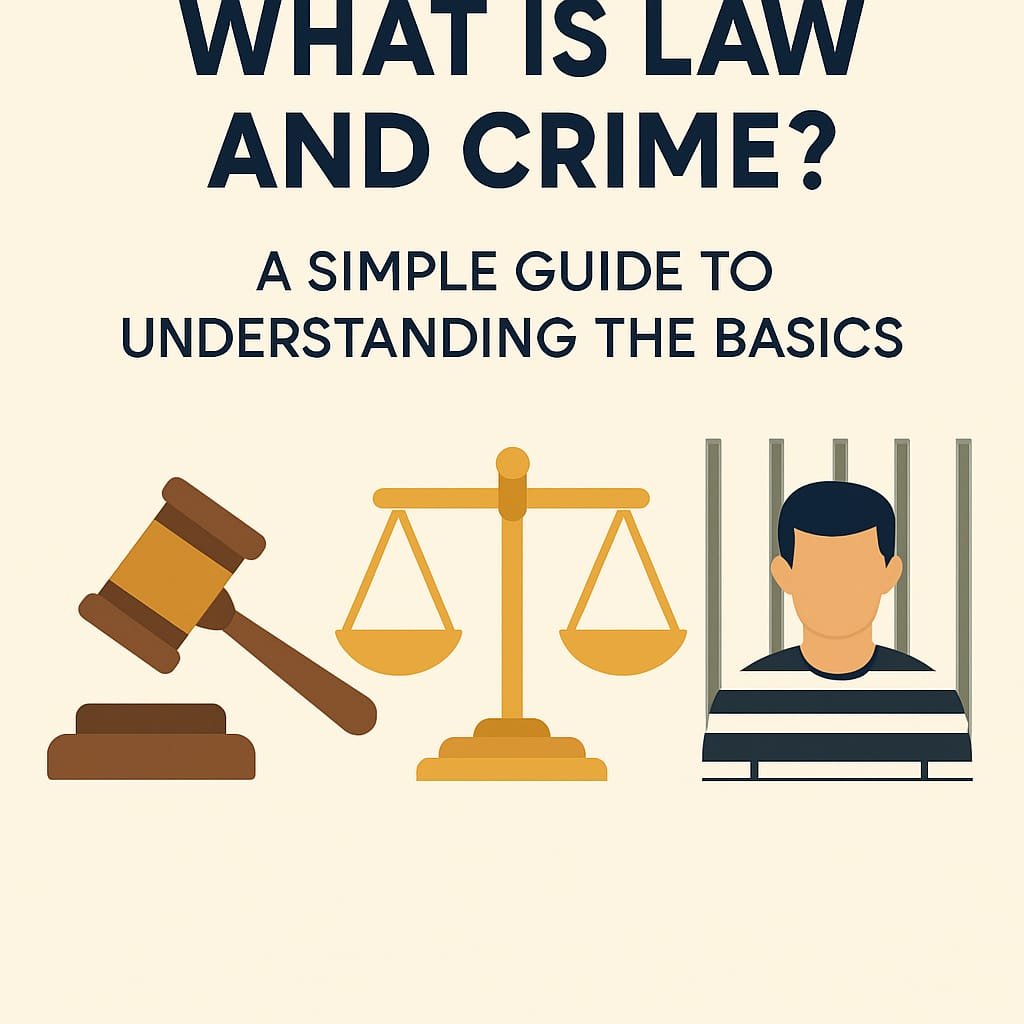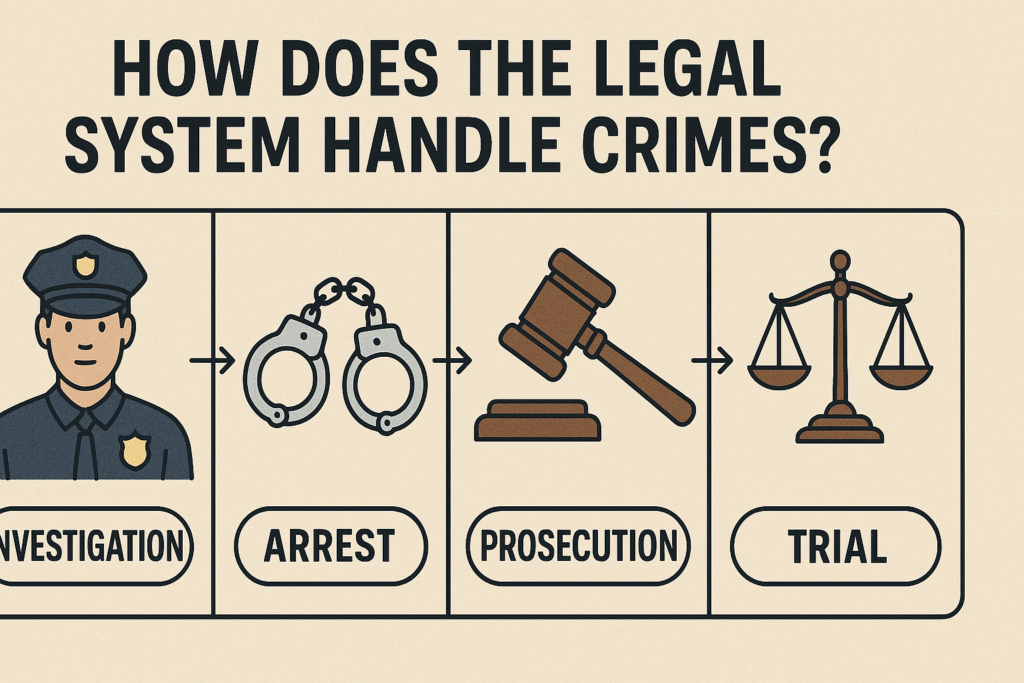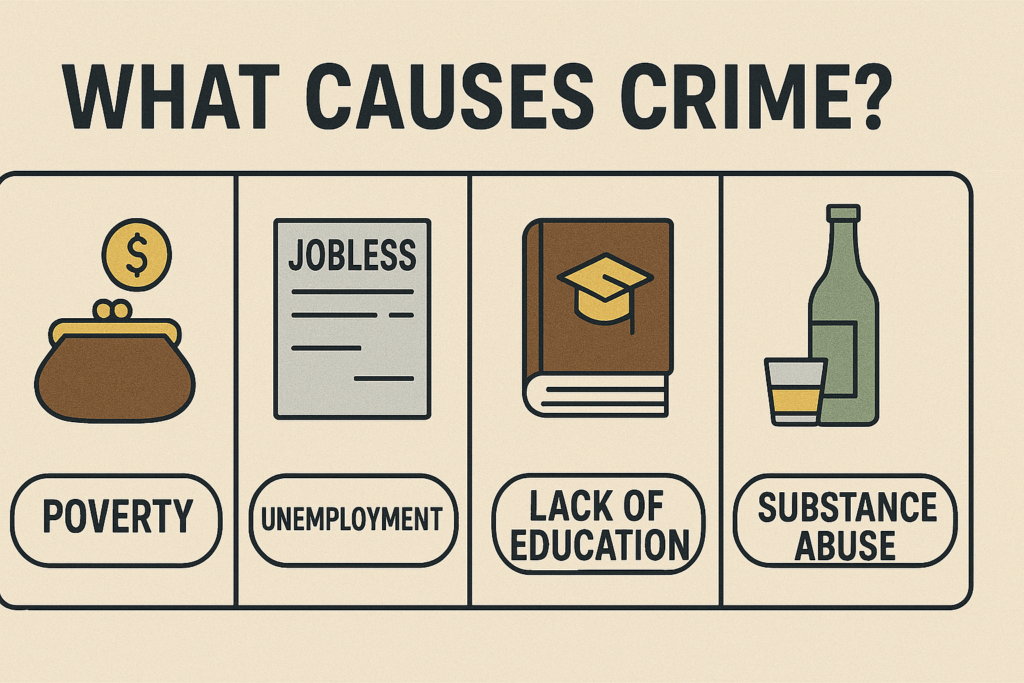Introduction
We have discussed What Is Law and Crime? A Simple Guide to Understanding the Basics Many people believe that law and crime are the same thing. Crimes are actions that break the law, but not every illegal thing is a crime. Laws create order in society, while crime disrupts that order. What are law and crime? After reading the law, you will understand how laws protect society, what is called crime, and the purpose of legal systems.

What Is Law? Understanding the Basics
What Is Law? A Simple Explanation
Laws are the rules that control society. They define what is legal and what is illegal and prevent crime. If there were no laws, everyone would do whatever they wanted, and nothing would be considered a crime.click here
How Does the Law Define a Crime?
A crime breaks the law and is punishable by law, but not everything illegal is a crime.What Is Law and Crime? A Simple Guide to Understanding the Basics
For example:
Breach of contract is illegal, but it is handled in civil court, not criminal court.
Jaywalking is against the law but not considered a serious crime.
Why Do Laws Exist?
Laws are not just for writing; they have real purposes behind them:
- This crime is committed by setting the consequences for legal purposes.
- They protect people’s rights so that there is no unfair punishment.
- They create order so that society runs smoothly.
How Laws Evolve Over Time
Laws change with time. What was legal 50 years ago doesn’t necessarily mean it’s still illegal today.
For example:
Previously, sex marriage was illegal in many places; now it is legal.
Previously, marijuana was considered a crime, but now it is legal in some places.
It is important to note that laws are not fixed; they evolve as society changes.
What Is Crime? Breaking It Down
Many believe every illegal action is a crime, but this is untrue. Not every unlawful act is a crime, and not every crime is the same. Some offences only result in civil penalties, while others can lead to prison sentences. click here
What Is Crime? A Simple Definition
A crime is an act that breaks a law and for which the government imposes a penalty. Crimes often harm individuals’ property or society. Unlike civil offences, crimes are public offences, whether they affect an individual or society.
What Makes an Act a Crime?
What Is Law and Crime? A Simple Guide to Understanding the Basics Something can be called a crime only when it fulfils certain specific conditions. These conditions depend on the legal system and crime classification, but some of the basic elements are:
- A Law Must Exist –There should be a law declaring it legal.
- Criminal Intent (Mens Rea): In most cases, the perpetrator of the crime must intend to act illegally.
- An Action (Actus Reus) –A crime is usually the result of an action, but sometimes the absence of an action is also a crime, such as not paying taxes.
What Is Considered a Crime Under the Law?
Different laws categorise crimes. Here are some common categories:
- Felonies vs. Misdemeanours –Felonies are crimes such as murder or armed robbery, while misdemeanours are minor offences such as(petty theft, and public intoxication).
- White-Collar Crimes vs. Violent Crimes –White-collar crimes (fraud, embezzlement) are based on financial fraud, while violent crimes (assault, murder) cause physical harm.
- Intentional vs Accidental Crimes – In which intentional offences receive more punishment, while accidental offences receive less
Law vs. Crime: The Key Differences
What Is Law and Crime? A Simple Guide to Understanding the Basics Many people consider law and crime the same, but this is a misunderstanding. Laws are rules, while crimes are violations of these rules.
Crime and Law Relationship
Laws exist to define and prevent crime. They decide what is right and what is wrong. When a law is broken and harms society, it becomes a crime.
Think of it this way:
- Laws = Traffic signals (They tell you when to stop and when to go).
- Crimes =Breaking Red light (If someone breaks the signal, an accident could occur).
Difference Between Crime and Legal Offence
Not every legal offence is a crime. These are the major differences:
| Legal | Crime |
| Covers many aspects of civil law (contracts, commercial disputes). | Violation of the law that harms society |
| Most often fines or compensation have to be paid. | Jail time, probation, or other service penalties may apply. |
| Handled in civil court. | Handled in criminal courts |
Legal System and Crime: How They Work Together
Every country’s legal system defines, regulates, and enforces laws to prevent crime. This system includes:
- Legislators –Which makes the laws
- Police –Those who enforce laws and investigate crimes
- Courts –Those who decide whether someone is guilty or not
- Prisons – Where criminals serve their punishment
Types of Crime and Their Legal Consequences
What Is Law and Crime? A Simple Guide to Understanding the Basics Many people think that all crimes are the same, meaning they are just bad deeds that are punished, but this is not true. Every crime is different, and its consequences are also different. Some crimes only harm individuals, while others affect the entire community or economy.
1. Crimes Against People (Violent Crimes)
These crimes directly harm a person and usually involve physical force. These are the most serious crimes that are also strictly punishable.
Examples:
- Murder –Taking someone’s life intentionally.
- Assault and Battery –To attack or kill someone.
- Kidnapping –To take someone by force
- Domestic Violence –Physical Abuse in Family Law or Relationships
- Legal Consequences: Their punishment can range from long prison sentences to life imprisonment or, in some countries, the death penalty.
2. Crimes Against Property
These crimes do not directly hurt people but involve stealing or damaging their property.
Examples:
- Theft (Larceny) –Taking someone’s things without permission
- Burglary –Entering a home or business with the intent to steal
- Arson –To intentionally cause damage by setting fire
- VandalismDamage or vandalize property
- Legal Consequences: The penalty depends on the property’s value. It can be a fine for petty theft or imprisonment for major property crimes.
3. White-Collar Crimes (Financial Crimes)
What Is Law and Crime? A Simple Guide to Understanding the Basics Not every crime is related to violence or theft. White-collar crimes are mostly financial, which business professionals comment on. These crimes may seem simple, but their impact is huge.
Examples:
- Fraud –Deceiving people for financial gain, such as insurance fraud, tax fraud
- Embezzlement –Stealing money from a company or employer
- Money Laundering –Showing illegal money through legal business.
- Identity Theft –Using someone’s personal information without permission
- Legal Consequences: Their punishment may include a fine, restitution (restitution), and jail time.
4. Cyber crime (Internet Crimes)
What Is Law and Crime? A Simple Guide to Understanding the Basics Cyber crime has also increased along with technology companies. Now, criminals are also conducting legal activities online.
Examples:
- Hacking –Breaking into someone’s computer or system without permission
- Online Scams and Fraud –Taking money by tricking people
- Cyber bullying –Threatening or harassing someone online
- Illegal Downloading and Copyright Infringement –Sharing copyrighted content without permission
- Legal Consequences: Depending on the severity of the crime, it can range from fines to jail time. Some people are banned from using certain digital platforms for life.
How does the Legal System handle crimes?

The criminal law of each country is different, but these steps are mostly followed.:
- Investigation –Police collect evidence and speak to witnesses.
- Arrest –If evidence is found, the suspect is arrested.
- Trial – Judges and juries decide whether a suspect is guilty or not.
- Sentencing –Punishment is decided upon conviction.
- Appeals –Can challenge the decision of the convicted person.
Common Criminal Punishments
Different punishments are depending on the severity of the crime.
Fines –You have to pay money for minor offences.
Community Service –Do free work for Society.
Probation –Instead of going to jail, they follow strict rules.
Imprisonment –Going to jail for serious crime
Death Penalty –For the most serious crime in some countries.
Why are criminal laws different in every country?
- Some countries allow the death penalty; some don’t.
- Drug laws vary – some legal, some strict penalties.
- Cyber crime laws are constantly updated.
Can criminals avoid punishment?
Yes, sometimes criminals escape punishment in such cases:
- ️ Plea Bargains –Light punishment is given for admitting a mistake.
- Good Behaviour –.Good behaviour in prison can lead to early release.
- Legal Loopholes –Lawyers can find technicalities and get charges dismissed.
What Causes Crime?
What Is Law and Crime? A Simple Guide to Understanding the Basics Many people think criminals are simply “born bad,” but that’s false. Crime isn’t in someone’s genes—a variety of factors cause it.

Social Causes of Crime
Society plays a very important role in a person’s behaviour. Sometimes, a person’s environment itself pushes him towards crime.
- Poverty and Unemployment –Society plays a very important role in a person’s behaviour. Sometimes, a person’s environment itself pushes him towards crime.
- Peer Pressure –Youth may commit crimes to fit in with gangs or neighbourhood groups.
- Lack of Education –It is difficult for people who are not educated to find jobs, and crime presents an easy option.
- Broken Families –Children from unstable homes grow up without guidance, which can lead them to criminal behaviour.
Psychological Causes of Crime
Is crime also caused by mental health issues or emotional instability?
- Anger and Aggression –Some people cannot control their emotions and commit violent crimes.
- Addiction –Drug or alcohol addiction can lead to theft, drug trafficking, or violent crimes.
- Personality Disorders –Some mental conditions, such as antisocial personality disorder, can lead a person to commit crimes.
Economic Causes of Crime
What Is Law and Crime? A Simple Guide to Understanding the Basics The need for money is also a major reason for crime. Some people commit crimes to get rich quickly, while others have no other option.
- Wealth Inequality –Crime rates start to increase when the rich get richer and the poor get poorer.
- Corruption Bribery, embezzlement, and financial fraud occur when people value money more than morality. When the rich get richer and the poor get poorer, crime rates start to rise.
- Lack of Job Opportunities –When people don’t have the option to make money from a legal background, they turn to illegal methods.
How to Prevent Crime?
What Is Law and Crime? A Simple Guide to Understanding the Basics Studies show that well-lit streets and surveillance cameras help reduce crime. Preventing crime does not mean punishing criminals but rather preventing crime before it occurs.
Stronger Laws and Law Enforcement
To prevent crime, laws must be strict and implemented properly.
- Harsher Punishments for Serious Crimes –Harsh punishments make people afraid to commit crimes.
- Better Policing –Where there are more police, there are fewer crimes.
- Use of Technology –CCTV cameras, facial recognition, and AI tracking help catch criminals quickly.
Reducing Poverty and Increasing Job Opportunities
What Is Law and Crime? A Simple Guide to Understanding the Basics Poverty is a major cause of crime; it is possible to reduce crime by providing financial assistance to people.
- More Job Programs: The government should create new job opportunities.
- Raising Minimum Wage: When people are making good money, they don’t turn to crime.
- Affordable Housing and Healthcare: When basic needs are readily available, people don’t commit crimes out of desperation.
Improving Education and Youth Programs
Education is a powerful tool for crime prevention.
- Better Schools – A good education increases opportunities for young people.
- After-School Activities – To take exercise and play different games.
- Teaching Conflict Resolution – Teaching young people to control anger and emotions can prevent violent crimes.
Economic Impact of Crime
What Is Law and Crime? A Simple Guide to Understanding the Basics Crime doesn’t just take lives; it also takes money. Governments, businesses, and governments lose billions annually due to criminal activities.
- Security cost increases –Businesses and homeowners spend extra money on alarms, security guards, and surveillance.
- Property and Assets Ka Nuksan –Theft, vandalism, and fraud cause direct financial losses.
- Insurance Premiums Become High –More crime means more income, which causes insurance companies to increase their rates.
- Impact on Business Growth Pe –Companies avoid high-crime areas, which reduces job opportunities.
- Government Spending on Law Enforcement –Police courts and prisons cost billions of dollars, which could be spent on education or healthcare.
Social and Psychological Impact of Crime
Crime also has a major impact on people’s mental and emotional health.
- Fear and Anxiety –People in high-crime areas always live in an atmosphere of fear that degrades their quality of life.
- Families Break up –Families of both victims and criminals face emotional and financial struggles.
- Trust in Society decreases – People stop blaming law enforcement and the justice system when crimes go unpunished.
- Vigilante Justice changes –In many places, people take the law into their own hands because they don’t trust the system.
How Law Maintains Order and Protects Society
Crime happens in every society, but laws keep it under control. Without laws, the world would become a mess, and no one would be able to escape.
The Role of Laws in Society
Laws are not just rules; they are the foundation of society. They ensure respect, protect rights, and hold people to account.
- Crime Prevention –Strict laws prevent people from committing crimes.
- Protecting Citizens –The law safeguards people’s rights so that their safety and freedom are maintained.
- Providing justice –Courts and Law Enforcement Victims who work to bring justice and punish criminals.
- Regulating society –Laws control everything from business to traffic rules to ensure order.
The Role of Police in Enforcing Laws
Police officers are the first line of defense against crime. Their job is to enforce laws and save communities.
- Patrolling and Crime Prevention –Strong police presence reduces criminal activities
- Crimes Ko Investigate Karna –Officers gather evidence so that crimes can be solved and criminals can be caught.
- Handling an Emergency – From theft to violent attacks, police manage all kinds of dangerous situations.
- Building Community Trust – Good policing builds trust between people and law enforcement.
Conclusion:
Crime will always exist, but strong laws are essential to save society and maintain order. Understanding the causes of crime and enforcing effective legal measures can create a more secure community. Crime impacts not only individuals but also communities and economies. Laws are important in maintaining order and delivering justice so society functions smoothly.